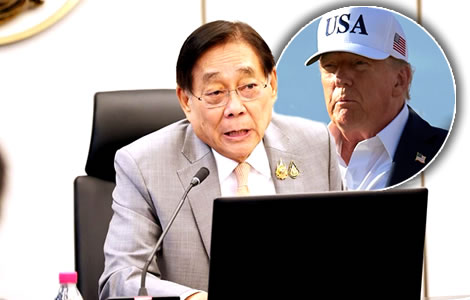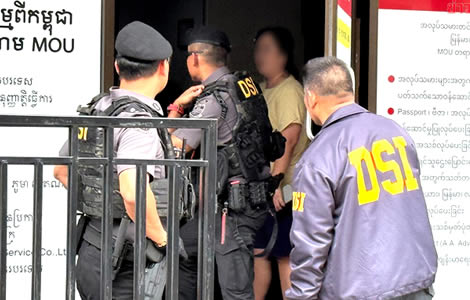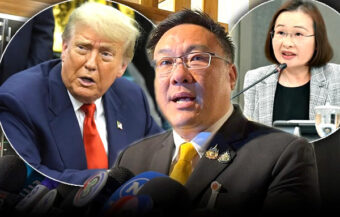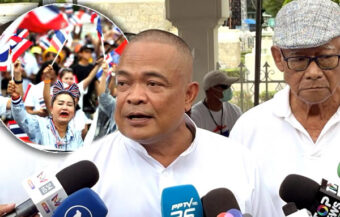Thailand scrambles to avoid devastating US tariffs after talks collapse. Mixed signals from Washington add uncertainty as the country offers major concessions. With rivals securing better deals, Thailand’s economic future and global standing hang in the balance amid US-China tensions that are dividing the world in two.
A high-stakes scramble is underway in Bangkok after last-ditch trade talks with the United States collapsed last Thursday. Led by Deputy Prime Minister and Finance Minister Pichai Chunhavajira, Thai officials are now racing against time to avoid devastating tariffs that could hammer the country’s economy. The Thai delegation was abruptly sent home from Washington, D.C., after failing to reach a deal. Over the weekend, Bangkok finally grasped the gravity of the moment. By Sunday, it had rushed through a dramatically revised offer—cutting tariffs on most U.S. imports to zero in a bid to salvage relations.

But time is short—and the signals from Washington are anything but clear. One moment, sources say a warning letter may already be en route to Bangkok, laying out the painful new terms. Next, the White House hints that the deadline for imposing the punishing 36% tariff may now be pushed to August 1st.
Still, nothing is guaranteed in Trump’s unpredictable world.
What’s at stake isn’t just billions of dollars in lost exports this year. It’s Thailand’s economic future—and its place in a world increasingly split between U.S. and Chinese influence.
Miss this window, and Thailand could be slapped with the worst trade deal in the region—worse than Vietnam, worse than Indonesia. Worse still, it risks sliding into the wrong side of a new global divide.
Thailand scrambles to stop looming US tariffs as rivals strike deals and industry faces deep disadvantage
Thailand is racing to avoid economic fallout from looming U.S. tariffs. Talks with Washington broke down last Thursday without agreement. Over the weekend, Thai negotiators realised the U.S. was serious. Officials concluded the threat of a 36% tariff was no bluff.
This would be devastating for Thailand’s export-reliant economy. The U.S. is Thailand’s top market. A 36% tariff could cripple key industries such as electronics, auto parts, and agriculture. Moreover, it would place Thailand at a disadvantage compared to its neighbours.
Vietnam, for example, has already secured a 20% tariff agreement. Indonesia, another export-driven economy, is reportedly close to a deal. That deal may involve even lower rates. Thai officials now fear their country could be handed the worst package in the region.
Consequently, Deputy Prime Minister and Finance Minister Pichai Chunhavajira swung into action. On Sunday, he submitted a new proposal to Washington. It offers substantial concessions, including zero-per-cent import tariffs on a wide range of U.S. goods.
According to Pichai, this offer does not disadvantage Thailand’s other trade partners. Rather, it aims to accelerate trade balance and increase long-term volume. While exact items weren’t disclosed, sources suggest the list includes industrial goods and possibly some agricultural products.
Revised offer marks bold shift in policy as Thailand aims to cut US trade surplus sharply within 5 years
The proposal is a major step. It marks a shift from Thailand’s earlier, more cautious approach. Officials now aim to cut the trade surplus with the U.S. by 70% within five years. That target is significantly more aggressive than a previous ten-year plan.
Pichai also promised faster progress. He said Thailand hopes to achieve a near trade balance within seven to eight years. This goal, he added, is achievable with close U.S. cooperation and strong domestic support.
The revised offer includes more than tariff cuts. Thailand is pledging to increase U.S. imports in energy and aviation. For instance, Thai petrochemical firms will import more U.S. ethane. State-owned PTT is exploring a deal to purchase 2 million tons of American LNG annually from Alaska over 20 years.
In addition, Thai Airways has expressed interest in ordering up to 80 Boeing aircraft. These purchases could be worth billions and help reduce the trade gap quickly.
However, time is short. Initially, the U.S. set July 9 as the deadline for tariff decisions. But on Sunday, U.S. Commerce Secretary Scott Bessent indicated tariffs may now take effect on August 1 instead.
This gives countries like Thailand a few more critical weeks. Even so, Bessent warned that letters informing nations of new tariffs would begin going out on July 7. Around 18 countries are on the list.
Trump targets BRICS as tariff threat escalates, putting Thailand’s global alignment under sharp spotlight
Furthermore, U.S. President Donald Trump issued a new warning. On Sunday, he threatened an extra 10% tariff on nations aligned with BRICS. BRICS now includes Brazil, Russia, India, China, South Africa, Egypt, Ethiopia, Indonesia, Iran, and the UAE.
Thailand recently moved closer to BRICS. Its cooperation with the group has worried Western diplomats, particularly in Washington. Thailand, after all, is still officially a U.S. military ally. Its growing engagement with BRICS has raised questions about its strategic alignment.
Trump’s warning was blunt. “Any country that supports the BRICS anti-U.S. policy will be subject to an additional 10% tariff,” he wrote online. The statement has caused concern among Thai officials, though they say it requires further analysis.
Pichai acknowledged the political angle. He said the government must carefully interpret Trump’s message. As of now, Thailand has not formally assessed how the BRICS link might impact tariff decisions.
Nevertheless, the economic stakes remain central. Thailand is determined to present itself as a cooperative and stable partner. Pichai said the proposed concessions are “mutually beneficial.” They allow the U.S. to expand exports while helping Thailand reduce bureaucracy and streamline its own trade processes.
Thai concessions seen as safe for local firms while Washington eyes broader realignment of global trade
Importantly, Thai officials argue the changes will not harm local producers. Many U.S. goods on the list are not in direct competition with domestic suppliers. Shortages exist in some sectors, making U.S. imports welcome rather than threatening.
Thai negotiators are also working to reassure Washington about Thailand’s overall policy direction. They emphasise the country’s commitment to free markets, the rule of law and democratic principles. This positioning is designed to contrast with the BRICS members, perceived as authoritarian.
The U.S. has long complained about trade imbalances. American products often face high tariffs and non-tariff barriers abroad. While previous administrations were more tolerant, Trump has pursued aggressive rebalancing. His current term has seen renewed efforts to reduce the U.S. trade deficit globally.
Since returning to office in January, Trump has reinstated tariffs and threatened more. In April, he dubbed the move “Emancipation Day” for American manufacturers. However, he granted a 90-day negotiation window before implementation. That pause is now ending.
Economic pressures mount as political crisis deepens, urgency grows to avoid a severe 2025 economic shock
So far, only two nations have struck deals—Vietnam and the United Kingdom. Even then, the U.K. has unresolved issues with tariffs on British steel. The broader landscape remains volatile.
Meanwhile, Thailand’s economy is already under pressure. Domestic consumption is sluggish. Household debt is the highest in Southeast Asia. Political uncertainty has added to investor unease. The recent suspension of Prime Minister Paetongtarn Shinawatra has shaken confidence.
Yet, there is one bright spot. Thai exports rose by 15% in the first five months of 2025. Much of that was driven by front-loaded shipments ahead of potential U.S. tariffs.
Still, experts warn that the impact of new tariffs could be swift. A 36% levy could shave up to 1% off Thailand’s GDP in 2025. Thousands of jobs could be at risk, especially in manufacturing hubs.
For these reasons, Pichai and his team are in full damage-control mode. The government is lobbying aggressively in Washington. Meetings last week included high-level talks with U.S. Trade Representative Jamieson Greer and Deputy Treasury Secretary Michael Faulkender.
Urgency drives talks as Thailand adjusts offers and navigates new world order of US and China spheres
Pichai described those talks as constructive. He said the U.S. side offered feedback on specific goods they wish to see included. In response, Thailand adjusted its proposal to meet those interests.
Despite the urgency, Pichai stressed that negotiations take time. He noted that decisions cannot be made by one person alone. However, all agencies involved are moving swiftly and in coordination.
The broader issue goes beyond tariffs. The global economy is dividing into two spheres. One is led by the U.S. and its democratic allies. The other is increasingly shaped by China and BRICS nations. Thailand is caught in the middle.
Turning point for Thailand as it awaits what could be a heavy economic sting from finalised US tariffs
Thailand strikes out at efforts to clinch a US tariff deal. Finance Minister Pichai now on the way home, not giving up
With the economy sputtering, the top Thai team flies to the US to secure a favourable trade deal with Trump
This makes the current decision pivotal. The outcome may influence not only Thailand’s 2025 economy but also its strategic future. Which path Thailand chooses may depend on how Washington responds.
For now, the clock is ticking. As Pichai put it: “If we move forward in the right direction, the world will recover. Trade will return. Thailand will be ready to grow again.”
The next few weeks will determine whether that vision becomes reality—or a missed opportunity.


















